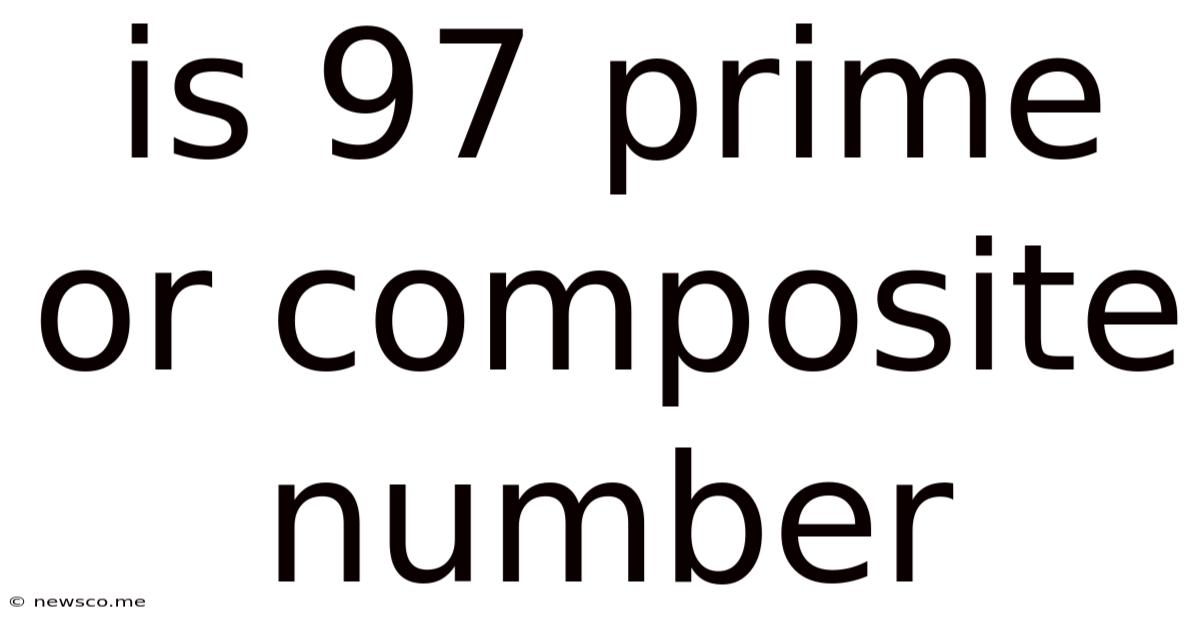Is 97 Prime Or Composite Number
News Co
Apr 16, 2025 · 5 min read

Table of Contents
Is 97 a Prime or Composite Number? A Deep Dive into Prime Numbers and Divisibility
Determining whether a number is prime or composite is a fundamental concept in number theory. This article will explore the question: Is 97 a prime or composite number? We'll delve into the definitions of prime and composite numbers, explore methods for determining primality, and finally, definitively answer the question about 97. We'll also touch upon the broader significance of prime numbers in mathematics and computer science.
Understanding Prime and Composite Numbers
Before we tackle the specific case of 97, let's solidify our understanding of prime and composite numbers.
Prime Numbers: A prime number is a natural number greater than 1 that has only two distinct positive divisors: 1 and itself. This means it's not divisible by any other number without leaving a remainder. Examples of prime numbers include 2, 3, 5, 7, 11, and so on. The number 1 is neither prime nor composite.
Composite Numbers: A composite number is a natural number greater than 1 that is not a prime number. In other words, it has more than two distinct positive divisors. This means it can be factored into smaller natural numbers other than 1 and itself. Examples of composite numbers include 4 (2 x 2), 6 (2 x 3), 9 (3 x 3), 10 (2 x 5), and so on.
Methods for Determining Primality
Several methods exist to determine whether a given number is prime or composite. Let's examine a few:
1. Trial Division: This is the most straightforward method, particularly for smaller numbers. You systematically check for divisibility by all prime numbers less than the square root of the number in question. If the number is divisible by any of these primes, it's composite; otherwise, it's prime. For example, to check if 29 is prime, we only need to check divisibility by 2, 3, and 5 (since √29 ≈ 5.39). Since 29 is not divisible by any of these, it's prime.
2. Sieve of Eratosthenes: This is a more efficient algorithm for finding all prime numbers up to a specified integer. It works by iteratively marking as composite the multiples of each prime, starting with 2. The numbers that remain unmarked are prime.
3. Fermat's Primality Test: This probabilistic test is based on Fermat's Little Theorem. While it doesn't guarantee primality, it provides a strong indication. It involves checking if a^(p-1) ≡ 1 (mod p), where 'a' is a randomly chosen integer and 'p' is the number being tested. If the congruence fails, the number is definitely composite; if it holds true, the number is likely prime, but there's a small chance it's a Carmichael number (a composite number that behaves like a prime number in this test).
4. Miller-Rabin Primality Test: This is a more sophisticated probabilistic test that improves upon Fermat's test by addressing the issue of Carmichael numbers. It's widely used in practice due to its efficiency and high accuracy.
Is 97 a Prime or Composite Number? Applying the Methods
Now, let's apply these methods to determine the primality of 97.
Using Trial Division: We need to check for divisibility by prime numbers less than √97 ≈ 9.85. These primes are 2, 3, 5, and 7.
- 97 is not divisible by 2 (it's odd).
- The sum of the digits of 97 is 9 + 7 = 16, which is not divisible by 3, so 97 is not divisible by 3.
- 97 does not end in 0 or 5, so it's not divisible by 5.
- 97 ÷ 7 ≈ 13.86, so 97 is not divisible by 7.
Since 97 is not divisible by any prime number less than its square root, we can conclude that 97 is a prime number.
The Significance of Prime Numbers
Prime numbers hold a significant position in mathematics and various fields of computer science. Here are some key aspects:
1. Fundamental Theorem of Arithmetic: This theorem states that every integer greater than 1 can be uniquely represented as a product of prime numbers (ignoring the order of the factors). This makes prime numbers the building blocks of all integers.
2. Cryptography: Prime numbers form the foundation of many modern cryptographic systems, including RSA encryption. The difficulty of factoring large numbers into their prime factors ensures the security of these systems.
3. Number Theory: Prime numbers are a central subject of study in number theory, with many unsolved problems and ongoing research, such as the Riemann Hypothesis, which deals with the distribution of prime numbers.
4. Computer Science: Algorithms for testing primality and factoring large numbers have significant implications for computer science and the efficiency of various computations.
Conclusion: 97 is Prime
Based on our analysis using trial division, we have definitively shown that 97 is a prime number. It is not divisible by any number other than 1 and itself. This seemingly simple number plays a part in the intricate world of mathematics and has significant implications for more complex applications in fields like cryptography and computer science. Understanding prime numbers and methods for determining primality is crucial for anyone venturing into the fascinating world of number theory. The search for larger and larger prime numbers continues, pushing the boundaries of computational power and mathematical understanding. The seemingly simple question of whether 97 is prime provides a gateway to understanding the deeper complexities of number theory and its importance in the modern world.
Latest Posts
Related Post
Thank you for visiting our website which covers about Is 97 Prime Or Composite Number . We hope the information provided has been useful to you. Feel free to contact us if you have any questions or need further assistance. See you next time and don't miss to bookmark.